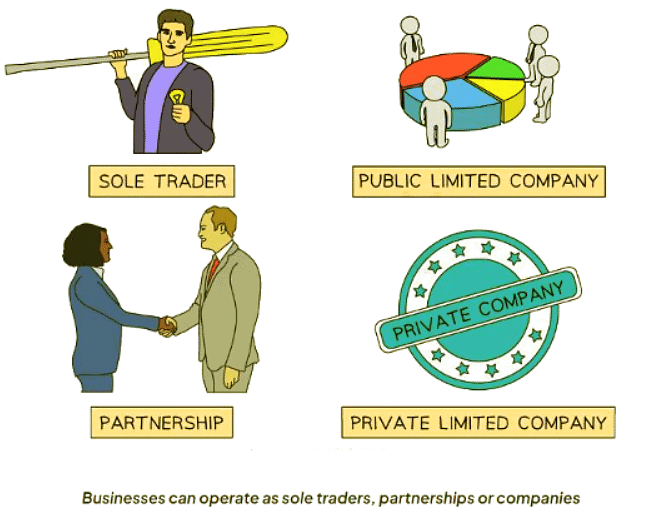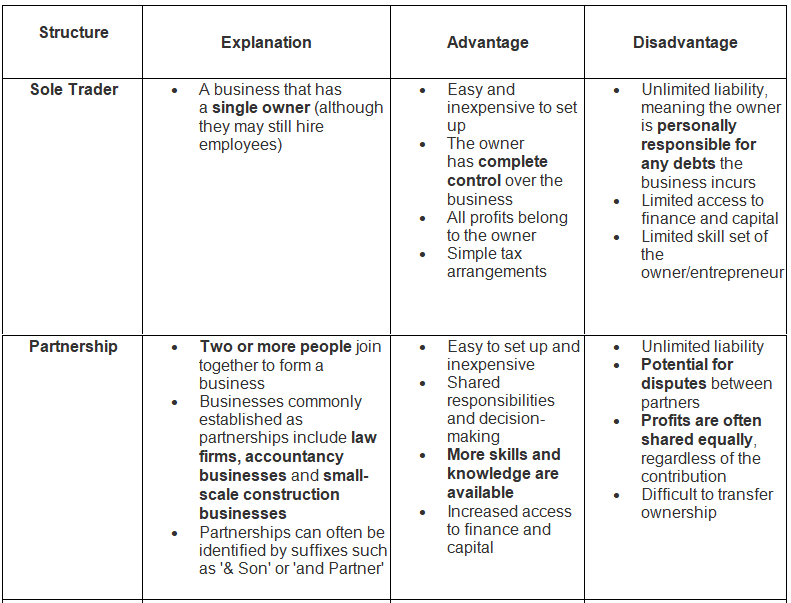Year 11 Exam > Year 11 Notes > Business Studies for GCSE/IGCSE > The Main Types of Ownership
The Main Types of Ownership | Business Studies for GCSE/IGCSE - Year 11 PDF Download
| Table of contents |

|
| Risk, Ownership, and Limited Liability |

|
| Business Ownership Types |

|
| Sole Traders, Partnerships and Limited Companies |

|
| Franchises & Joint Ventures |

|
| Joint Ventures |

|
Risk, Ownership, and Limited Liability
- When starting a business, entrepreneurs must decide on a suitable legal structure based on various considerations such as:
- The level of personal risk they are willing to undertake.
- The advice they receive regarding the business setup.
- The desired level of privacy in operating the business.
Business Ownership Types

- Sole Traders and Partnerships
- Sole traders and partnerships are businesses with unlimited liability.
- They are simple to establish and commence trading.
- Financial information does not need to be disclosed outside the business.
- Private Limited Companies and Public Limited Companies
- These companies provide limited liability protection to their owners (shareholders).
- Establishing a company involves a legal process that requires time to organize.
- Financial performance details must be shared with Companies House and are open to scrutiny by interested parties.
A Comparison of Unlimited & Limited Liability

Question for The Main Types of OwnershipTry yourself: What is a key difference between sole traders/partnerships and private/public limited companies?View Solution
Sole Traders, Partnerships and Limited Companies
- When an individual embarks on a business endeavor, they commonly commence as a sole trader.
- Gradually, or when substantial investment is needed, they might alter the business's legal structure.
- They could collaborate with others to establish a partnership in order to secure more funding or expand their operations.
- Alternatively, they may opt to create a private limited company to offer increased financial protection for the proprietors through limited liability.
Advantages and Disadvantages of Different Ownership Structures


Franchises & Joint Ventures
Franchising
- Franchising involves a business (franchisee) purchasing the rights to operate a successful business model from another company (franchisor).
- These rights typically include using the established branding, software tools, and receiving support from the franchisor.
Popular Franchise Businesses

- The franchisee manages the business following the established system of the franchisor and benefits from training, marketing assistance, and continuous support.
- Initially, the franchisee might operate as a sole trader, partnership, or private limited company. However, franchisors typically mandate the franchisee to establish a private limited company.
Advantages and Disadvantages of Franchising

Joint Ventures
- Joint ventures entail a medium- to long-term collaboration between two or more distinct businesses, aimed at achieving a specific business objective, such as entering a new market.
- This collaboration results in the formation of a new combined business entity.
- Risks and rewards are distributed among the participating parties in the joint venture.
- Businesses engaging in joint ventures typically seek to leverage complementary strengths and resources brought to the venture.
- Many European companies have established joint ventures with counterparts in China, where the insight of Chinese managers and employees into market needs and consumer preferences enhances the venture's chances of success.
- The Chinese government encourages joint ventures over foreign direct investment (FDI).
- For example, in 2003, German car manufacturer BMW and Chinese rival Brilliance Auto Group established a joint venture named BMW Brilliance to manufacture and market BMW cars in China.
The Advantages and Disadvantages of Joint Ventures

Question for The Main Types of OwnershipTry yourself: What is the main purpose of franchising?View Solution
The document The Main Types of Ownership | Business Studies for GCSE/IGCSE - Year 11 is a part of the Year 11 Course Business Studies for GCSE/IGCSE.
All you need of Year 11 at this link: Year 11
|
70 videos|94 docs|25 tests
|
FAQs on The Main Types of Ownership - Business Studies for GCSE/IGCSE - Year 11
| 1. What are the main types of business ownership? |  |
Ans. The main types of business ownership are sole traders, partnerships, limited companies, franchises, and joint ventures.
| 2. What is the difference between a sole trader and a limited company? |  |
Ans. A sole trader is a business owned and operated by one individual, while a limited company is a separate legal entity from its owners, providing limited liability protection.
| 3. How does limited liability protect business owners? |  |
Ans. Limited liability protects business owners by limiting their personal liability for the debts and obligations of the business, ensuring that their personal assets are not at risk.
| 4. What is a franchise and how does it work? |  |
Ans. A franchise is a business arrangement where the owner of a brand or business (franchisor) grants a license to an individual or group (franchisee) to operate their business under the franchise's name and system.
| 5. What are the advantages of a joint venture for businesses? |  |
Ans. Joint ventures allow businesses to combine resources, expertise, and market access to pursue opportunities that may be too costly or risky to undertake alone, leading to potential growth and expansion.
Related Searches


















